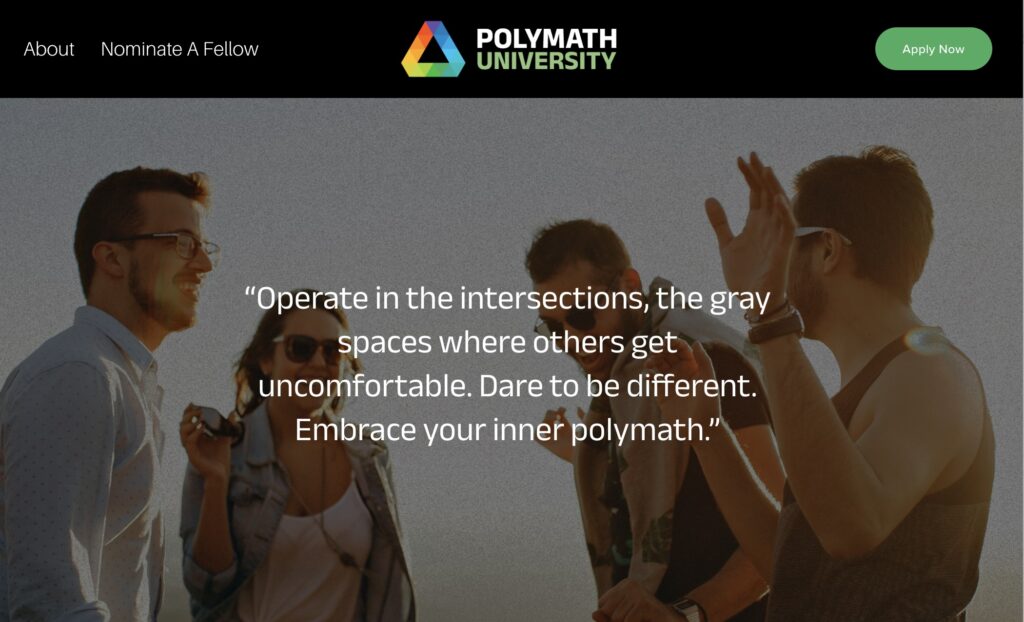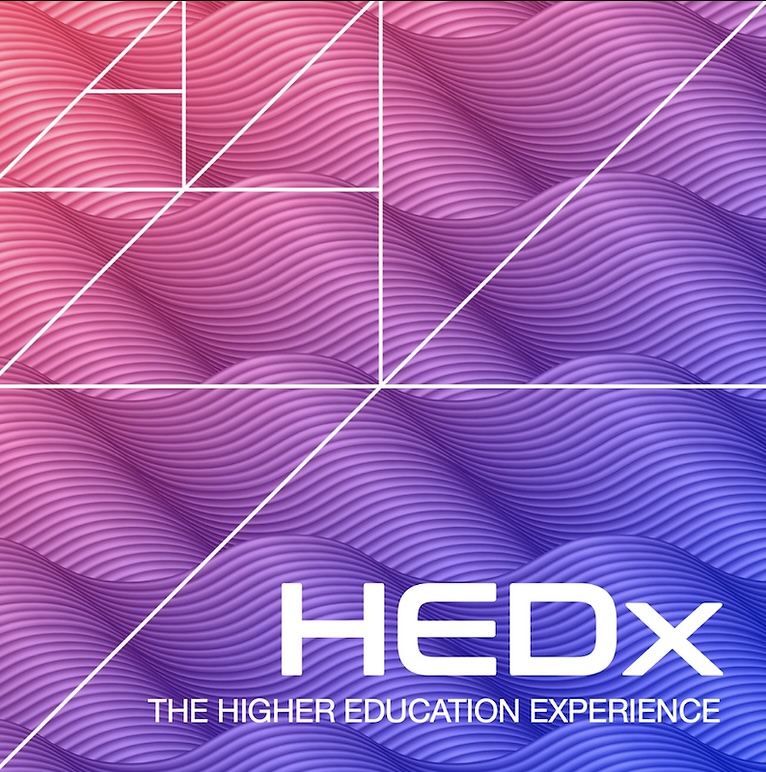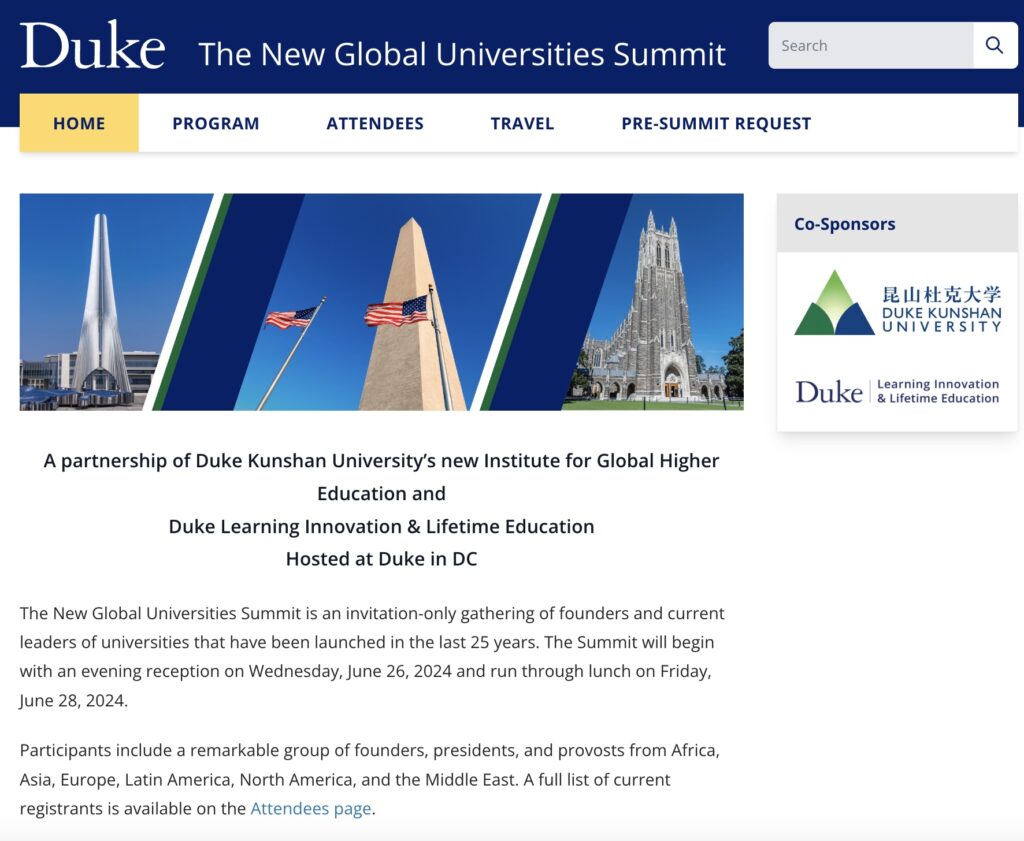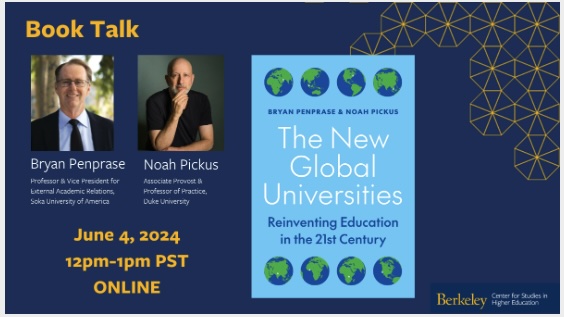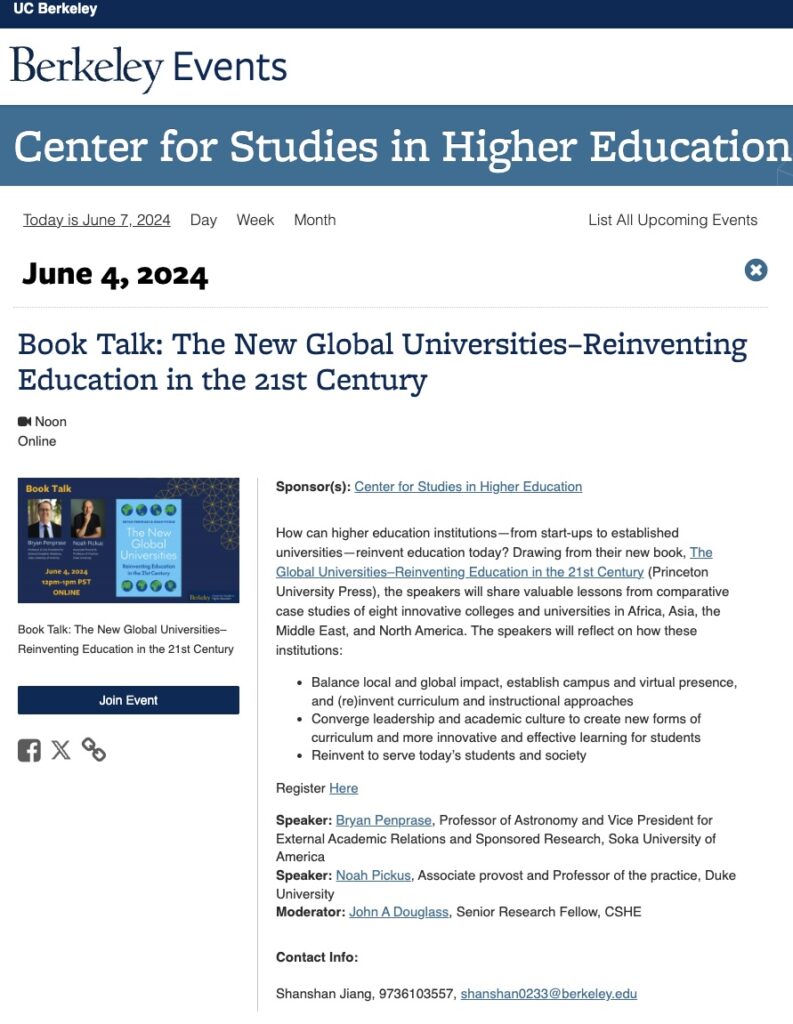During the last week, the meetings at our New Global Universities Summit in Washington, DC, attracted notice from the Chronicle of Higher Education. The Chronicle of Higher Education sent reporters Goldie Blumenstyk and Karin Fischer to attend our meeting, which included 60 founders of new universities at the Duke in DC center in Washington DC on June 26-28. Goldi Blumensyk wrote about the event in her newsletter at the Chronicle of Higher Education with the heading “New Institutions can Invigorate Higher Ed.” This article highlighted the work being done at Polymath University, represented by its founder Dan Futrell, along with African Leadership University, represented by Veda Sunasse (CEO) and Brian Rosenberg (Harvard GSE and ALU board member), and the University of Austin, whose founding president Pano Kanelos attended the meeting. The meeting had many great discussions, and perhaps most importantly, it helped forge a community of practice among the university founders to help their fledgling new universities share some of the innovations and excitement as they build new models for higher education. I also especially enjoyed connecting with Ivan Borafull from the Spanish business school ESADE, with Babs Omotowa, who is the founding president of the Nigerian University of Technology and Management, with Carl Gombrich, Dean of the London Interdisciplinary School, along with many of my old friends from Yale-NUS College in Singapore, DKU, and from Olin College of Engineering.
Book endorsement from Dan Furtrell, founder of Polymath University
Dan Futrell, the founder of a bold new university in Chicago known as Polymath University, has provided a rousing endorsement of our book on his LinkedIn site. Dan will attend our New Global Universities Summit in Washington, DC, and I look forward to learning more about his new Polymath University from him at the meeting. The Polymath Univeristy is “a 3-year, interdisciplinary, apprenticeship-based and debt-free school built from the ground up to empower leaders with the breadth, depth, and integration needed for impact.” The concept promises to rewrite some of the rules about how universities can structure their business model and cost points to make their education much more affordable and more relevant to students in finding future careers.
One interesting aspect of Polymath University is that while it is based in Chicago, it plans to offer its programs across the US and, therefore, will be much less expensive to operate and have wider reach than a typical brick-and-mortar institution. Despite not having a full residential campus experience, Polymath University promises to build strong cohorts of students by grouping them into regions and offering hybrid courses with in-person components as a central part of their program. As described on their website:
Polymath University doesn’t have a physical campus but will launch in Chicago, Illinois. Once launched, we plan to expand to other urban and rural cities nationwide. As described on their website:
“While courses will be offered in a hybrid format with approximately two weeks in person per academic year, our cohort of students will all be from the same city. This allows for our in-person time to be low-cost for students, with in-person instruction being accessible by public transit. This also allows for students to build their social and professional networks with other students and to create study groups for increased collaboration.”
The Polymath University program sounds really fascinating, and as part of the cohort of New Global Universities – we wish Dan and Polymath University well!
Our HEDx Australia podcast – “The Intertia of Excellence” available now
On June 13, 2024, my co-author Noah Pickus and I had a wonderful conversation with Martin Betts, who runs a podcast through the HEDx organization. The HEDx podcasts discuss a wide range of topics about the future of education and have a vast global following. More importantly, Martin seems to have read our book carefully and had several excellent questions for us to respond to about how new universities navigate past daunting obstacles and find some sense of collective identity – otherwise known as “institutional culture.” Martin is the founder of HEDx, which was created as an outgrowth of Martin’s thinking about bringing change and new types of leadership to higher education. The HEDx podcast with Noah and me has just been made available on both Spotify and Apple podcasts at this post’s links. We look forward to your feedback and thoughts! The page for the HEDx podcast is available at https://hedx.com.au/podcast-hedx-episode-126/. It features a working title of “The Inertia of Excellence,” which we referred to in our book as a mechanism that prevents top universities from changing and, in many cases, innovating – hence the need for new universities!
New Global Universities Summit in Washington DC at Duke in DC
I am excited to attend the New Global Universities Summit in Washington DC, co-organized by Duke University and my co-author, Noah Pickus, as an outgrowth of our book The New Global Universities. The Summit brings together over 60 top thought leaders and founders of new universities worldwide to work together to articulate the lessons learned and the value offered to higher education by their bold initiatives in founding universities in all parts of the world. The summit gives a chance for these new universities to share ideas on future collaboration, disseminate the innovations they have made in their curriculum, organizational leadership, and program structure, and collectively reimagine how higher education can be structured for the coming decades. The leaders include writers, such as Karen Fischer from the Chronicle of Higher Education and many from Duke University and Duke Kunshan University, who are hosting the meeting at their Duke in DC location. I am delighted to have a chance to meet with the leaders of many of the new universities we wrote about in the book, including Ben Nelson from Minerva University and leaders representing African Leadership University in Rwanda, Ashoka University in India, and Yale-NUS College in Singapore, Fulbright Univeristy Vietnam, NYU Abu Dhabi, and Olin College of Engineering. I look forward to visiting these amazing institutions as they become a powerful force for change and innovation in higher education worldwide. I am particularly interested in helping these institutions foster a more reflective and agile institutional culture and develop new ways to share their best teaching and curriculum development practices.
Talk at UC Berkeley Center for Studies in Higher Education (CSHE)
On June 4, 2024, Noah Pickus and I gave a book talk on our book, The New Global Universities, at the UC Berkeley Center for Studies in Higher Education (CSHE). The talk was moderated by John Douglass, a friend and collaborator, who has been a gracious host for my visits to CSHE as a visiting scholar, and who is a co-author with me in several pieces about higher education in Singapore and Hong Kong, including a chapter in his book on Envisioning the Asian New Flagship Universities.
The talk included many thoughtful questions from John Douglass, who helped us clarify how these small schools in our book are not to be dismissed as “boutique” institutions, but rather have had a transformative effect already on reshaping higher education globally. Examples include the transformation in engineering education sparked by Olin College, the new model of ethical entrepreneurial leaders being fostered by Ashesi University in Ghana, and the new types of regional studies courses developed at NYU Abu Dhabi and Fulbright University Vietnam, which are helping reshape how we interpret the Arab World, and Vietnam’s role in the world, respectively.
We are grateful to John Douglass and Shanshan Jiang for helping organize the meeting and helping us have this great discussion about these important issues.
Our Article on Start-up Universities Published in University World News
My co-author, Noah Pickus, and I published a recent article in University World News entitled “Startup Universities inject new energy into the HE system.” The article opens with a story of how Noah and I came together to begin our book project, and how the global journeys that Noah and I took in our lives helped us experience some of the excitement of starting new universities and helping create new models of higher education in Asia and how these new universities give alternative and novel approaches to learning that are so much needed in today’s world.
The article describes how these new universities in some cases help students in countries like Ghana, India and Vietnam receive a top-quality liberal arts education at a small fraction of the price that it would take to travel to the US or Europe, and by staying within their home country or region, are more likely to then be retained as leaders and scholars within those regions to help advance their economies and cultures. The article also describes new approaches to staffing, and how many of these new universities have been able to avoid granting tenure (using long-term contracts instead) and creating competing department, and how this approach has reduced costs and increased campus unity and coherence.
The article also gives examples of many of the innovative advances provided by these new universities. To provide a brief quote, here is a section from the article about these innovations:
Examples include the four-year leadership curriculum at Ashesi University in Ghana, which allows students to integrate lessons from the classroom with their lives as students as they become the type of ethical entrepreneurial leaders that Ashesi hopes will promote a ‘renaissance in Africa’.
Also, new courses in Vietnamese studies developed at Fulbright University Vietnam, which explore the many dimensions of Vietnam’s culture, politics and economics as it has evolved after the ‘American War’ of the previous century.
Many start-ups, by abandoning disciplinary departments, can also structure their degree programmes along interdisciplinary lines of inquiry that strongly incorporate experiential learning.
Examples include the African Leadership University, which has several immersive internships and real-world experiences as part of the curriculum in entrepreneurship, and the project-based learning curriculum at Olin College of Engineering, where students begin designing new inventions in their first year of study, and continue through all four years to even develop designs for their own companies as part of the curriculum.
(From our article, “Start-up universities inject new energy into the HE system,” June 3, 2024, University World News).
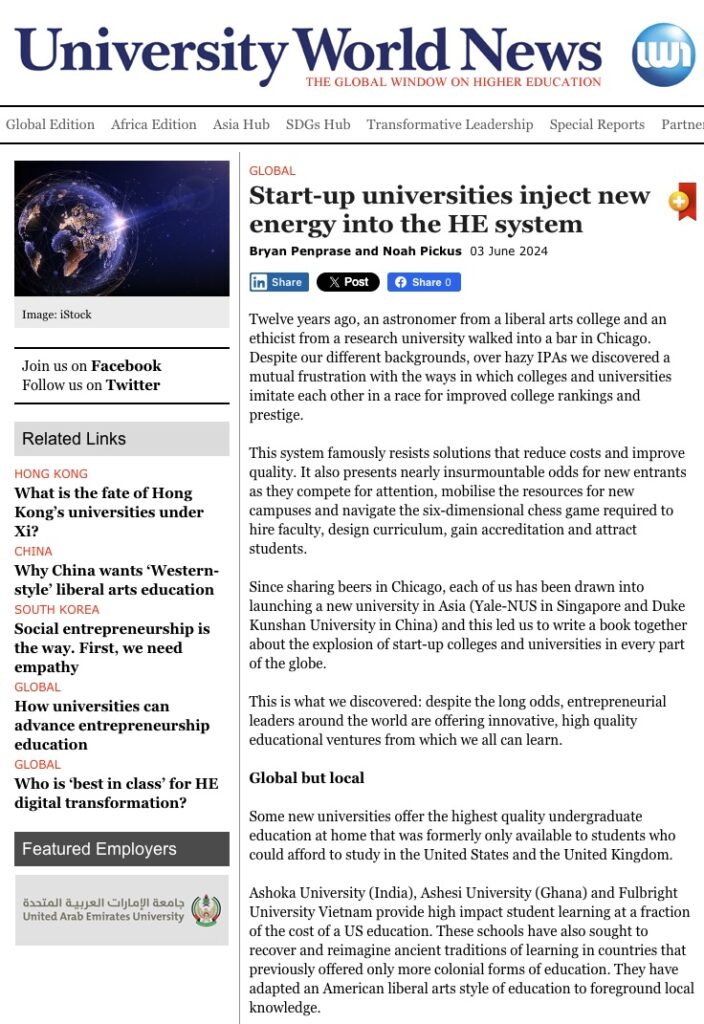
We are grateful to University World news for the speedy publication of the article, and for the help it gave us in reaching an important new audience for our book.
Talk for Open Society University Network
On May 29, my co-author Noah Pickus and I gave a talk for the Open Society University Network (OSUN), which is led by the courageous and innovative leaders at Bard College in New York, and the Central European University in Vienna, Austria. The network includes nearly 30 member universities across the world, in a range of countries and territories including Afghanistan, Kyrgyzstan, Bangladesh, Ukraine, Palestine, and Taiwan. The network also includes Ashesi University, one of the institutions we wrote about in our book, the New Global Universities. The image below, from the OSUN website, shows the scope of this global network.
The announcement for the talk included a nice blurb about the book, and we had a global audience of attendees who asked very good questions. We are grateful to Gray Rinehart for the invitation. Among the attendees were representatives of universities such as Parami University, based in Myanmar, and led by Kyaw Moe Tun, who asked some good questions. Parami University has been part of many of our discussions within the Pacific Alliance of Liberal Arts (PALAC), a group based at Soka University of America, that I founded along with Thomas Schneider, who is now leading the Association of Pacific Rim Universities (APRU).
We especially valued the chance to think about how new universities can help engage students and communities within countries that are struggling to gain greater freedom, and we believe that high quality liberal arts education, with academic freedom to explore deep questions that affect all of us as common members of humanity, provides the greatest hope for peace and a better world. Our new universities we write about are helping to build this better world, along with the universities built and led by the members of the OSUN group.
TOI-3984 A b and TOI-5293 A b: two temperate gas giants transiting mid-M dwarfs in wide binary systems
With a collaborator from Penn State University, we brought our little Nieves Observatory of the Soka University of America into its first published astrophysical paper. The project was to use our 0.3-meter telescope to confirm the detection of an extrasolar planet that was earlier detected by the satellite TESS. The light from the star is dimmed when the planet crosses in front of the star (or transits), and this allows measuring the size of the planet by comparing the radius of the planet with the star’s radius, which is derived from the fractional amount of light blocked during the transit. Our telescope was used remotely from PSU, and the data helps us learn more about the planets in these systems.
The paper was entitled “TOI-3984 A b and TOI-5293 A b: Two Temperate Gas Giants Transiting Mid-M Dwarfs in Wide Binary Systems” and was published in the Astronomical Journal in 2023. The paper confirms the existence of two gas giant exoplanets, TOI-3984 A b and TOI-5293 A b, orbiting M dwarf stars identified by TESS. These planets are notable for their relatively cool temperatures and their presence in wide binary systems, each with a significant stellar companion. The study utilizes a combination of TESS photometry, ground-based observations, speckle imaging, and high-precision radial velocity measurements to characterize the planets. TOI-3984 A b has a mass of approximately 0.14 Jupiter masses and an orbital period of 4.35 days, while TOI-5293 A b has a mass of 0.54 Jupiter masses and an orbital period of 2.93 days. The findings highlight the potential for these systems to provide insights into the formation and migration of gas giants around M dwarfs and their atmospheric compositions.

This paper contributes significantly to our understanding of exoplanetary systems, particularly in the context of gas giants orbiting M dwarf stars. Traditionally, gas giants have been found around more massive stars, making these findings around M dwarfs relatively rare and valuable for comparative planetology. The study of TOI-3984 A b and TOI-5293 A b offers insights into the diversity of planetary systems and challenges existing models of planet formation and migration, especially in the less massive protoplanetary disks around M dwarfs. Additionally, the characterization of these planets expands our knowledge of temperate gas giants’ atmospheric properties and potential habitability. The methodologies employed in this paper, combining space-based and ground-based observations with high-precision spectroscopy, set a precedent for future studies of similar exoplanetary systems.
(note: this summary was made with the assistance of GPT 4o).
Multi-wavelength Photometry and Progenitor Analysis of the Nova V906 Car
With my former Yale-NUS student Jerrick Wee and former collaborator from Caltech Nadeja Blagorodnova, we studied an erupting nova known as V906 Car in optical and infrared wavelengths, using remotely operated telescopes in Chile. Two of our Soka University of America students, Taiga Morioka and Jeff Facey, contributed to the work. The paper was published in the Astrophysical Journal in 2020.
The paper was entitled “Multi-wavelength Photometry and Progenitor Analysis of the Nova V906 Car,” and presented an extensive observational study of the classical nova V906 Car (also known as Nova Car 2018 and ASASSN-18fv), discovered by the ASAS-SN survey on March 16, 2018. We provided detailed optical and infrared photometry data, highlighting the nova’s evolution over 126 days. The nova’s light curve showed a steep decline with a decline rate parameter ∆m15(B) = 0.88 and negligible host galaxy reddening. High-resolution spectroscopy estimated the extinction towards the nova as AV = 1.11+0.54−0.39. The progenitor system analysis suggests a white dwarf mass of < 0.8M☉, and a donor star likely being a K-M dwarf with 0.23-0.43M☉. The study contributes valuable data on novae’s light curves and spectral energy distribution, enhancing our understanding of their physical properties and progenitor systems.

The study of V906 Car provides critical insights into the broader astrophysical understanding of nova systems. By capturing the nova’s early rise and detailed multi-wavelength photometry, the paper contributes to refining models of nova outbursts, particularly the shock-powered mechanisms suggested by correlated optical and γ-ray emissions. The accurate measurements of extinction and distance further validate the use of classical novae as standard candles for cosmic distance calculations. Additionally, the analysis of the progenitor system enriches our knowledge of white dwarf accretion processes and the role of donor stars in nova systems, which are essential for understanding stellar evolution and binary interactions.
(note: this overview provided with assistance from ChatGPT 4o).
Stanford University Book Talk – May 15, 2024
With sponsorship from Stanford Digitial Education, my co-author Noah Pickus and I will be giving a talk on May 15, 2024, at 1 PM PST. The talk will be available to all via Zoom, and the registration link is below. I include a flyer and other images from the event below as well. The talk will include Minu Ipe, who is the vice chair and managing director of the University Design Institute of Arizona State University. Minu will moderate the discussion, and Noah and I will give an overview of the book, the eight amazing new universities we wrote about, and a discussion with the audience about the lessons these new universities provide for innovation and change in higher education. I hope you can join. Please share this with your friends!
https://stanford.zoom.us/webinar/register/WN_xRh46z3zQ6q0N8T2ugEWXw#/registration
The event is part of a series on Academic Innovation for the Public Good, and the Stanford Digital Education office has been sponsoring these as a series of talks. The link to the event website is below.


